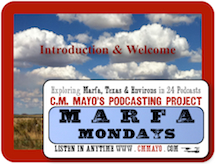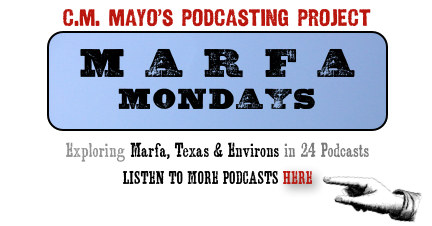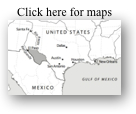|
Author of The Last Prince of the Mexican Empire, etc. |
|
|

|

|

|
|
INTRODUCTION AND WELCOME |
|||
 |
|||
|
(APPROX 16 MINUTES) |
|||
|
|
|||
|
Announcer: Welcome to Marfa Mondays with your host, award-winning travel writer and novelist C.M. Mayo. [MUSIC] C.M.
Mayo: A
very warm welcome to you on this very first in a series of 24
podcasts beginning today, Monday, January 16, 2012, through the
end of 2013. I'm your host, C.M. Mayo, and I'm not in Marfa today but Mexico City. In this first podcast, I'd like to introduce myself and the whys and wherefores of this project which, I have to tell you, I am so excited about. I grew up in California and, to make a long story short, I've been living in Mexico City on and off for over 20 years. But I was born in Far West Texas so, in a way, for me, this project is a coming home. Marfa
is a small town of about 2,000 residents out in the more or less
middle of Far West Texas. It's on the high plateau, and I do
mean high, almost 5,000 feet above sea level in the Chihuahuan
Desert. I am
going to be podcasting about much more than the town of Marfa.
I'm going to be looking at Marfa and environs, and that includes
Alpine, Fort Davis, Marathon, Valentine, Presidio, some of the
ranches and the rivers, hot springs, and the various mountain
ranges. In sum, the whole region of the Big Bend. Ever
since I first heard about it, I yearned to go there. About a
decade ago, on a brief visit, I drank in the majesty of the vast
spaces, the bluer than blue skies, and at night, stars beyond
stars, and— yes, they are real—the
Marfa Lights.
But
a few preliminary things I can say are that I'm especially interested
in exploring the contrasts
and comparisons with the subject of my previous travel memoir,
Miraculous Air, about Mexico's Baja California peninsula.
I imagine that some or perhaps many people in Marfa at some point may find these podcasts and my webpage via a Google search or, say, a "hashtag" on Twitter. So the writer's relative anonymity as he or she travels has evaporated. Similarly, these days, far more of a writer's research before, during, and after traveling is on-line. And with Facebook, Twitter, Tripadvisor, YouTube, wepages of all kind, we are experiences a hyper-acclerating transparency—or, the sometimes misleading appearance of transparency. I find this very interesting. So why the podcasts? And by the way, what is a podcast? You're listening to one. It's just an on-line audio file. So think of a podcast as a radio show but one you can listen to when you want— now, in five minutes, or five years. In the past, as I did while writing Miraculous Air, I would have turned out a series of travel articles for newspapers and magazines. Well, I never say never. I may still write an article or three, but I am less interested in which is the cheapest or the best or the coollest bed-and-breakfast, etc., than I am in talking to people. And now that podcasting is possible, rather than stash my notes and taped interviews in the drawer, I can share them. Who are some of the
people who live in this remote and magnificent place? How is
this part of West Texas unique, or similar to other places? How
are things changing? What is it that outsiders inevitably miss?
(What are those Marfa Lights?) [MUSIC] |
|||
|
|
|||
|
|||

|

